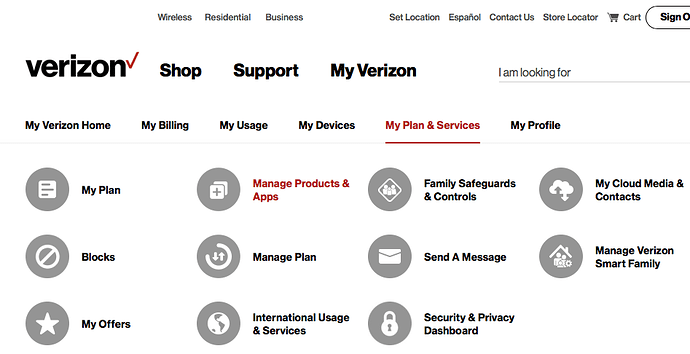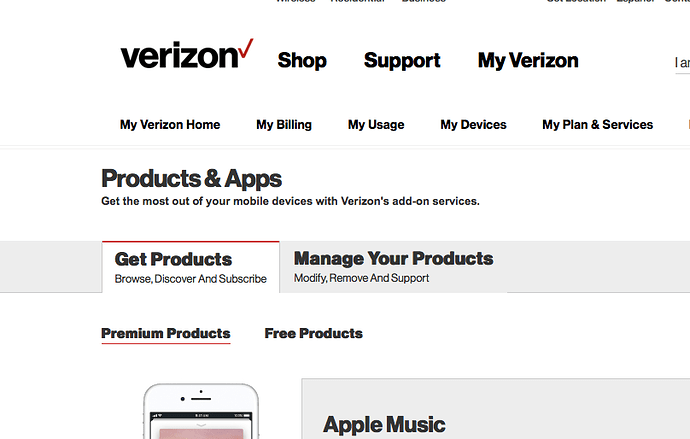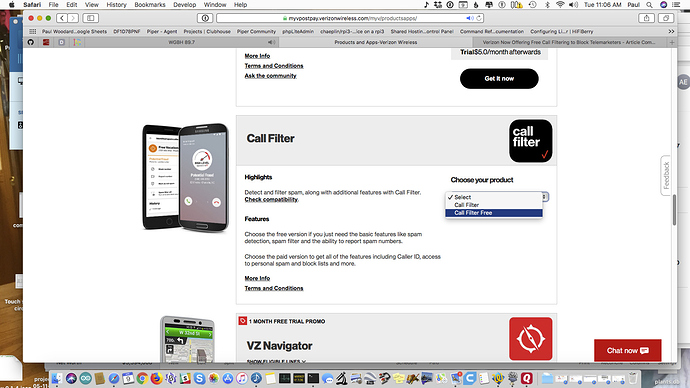The FAQ claims you can also turn it on by logging in to the My Verizon site. What does it say there?
I check the Verizon site. While there was a page that provided instructions on how to set up free Verizon Call Filtering via the web site, when I check my account free Verizon Call Filtering was not an option. The only option for Call Filtering was a subscription.
I am wondering if (1) Verizon offered a free service and withdrew it or (2) the free service is available only in certain states.
I think it’s time for someone to just call Verizon support and ask. :-)
Ok, I found it on the verison site.
-
Sign in to your verizon account
-
Go to
My Plans & Services -
Select
Manage Products & Apps
-
Use the
Get Productstab and thePremium Productsoption
-
scroll down till you find the
Call Filterapp and select theCall Filter Freeoption
NOTE: I have 5 lines and I had to go thru this multiple times since it only shows two lines at a time.
Hope this helps others
Paul
Regulation has failed to solve this problem in the past, and will continue to fail. A market based solution is needed, and very easily implemented: the carriers should charge every caller some token amount, say 1c, for every call placed. No exceptions! No bulk calling plans! 1 cent would probably be enough, but I’d gladly pay 10c per call to avoid the scourge of spam calls! It would be a win for me, and I bet the carriers would make more money. Why isn’t this obvious?
That’s an interesting idea. This wasn’t a big problem back when calls actually cost money. I’m with you on preferring a market-based solution if feasible, and I think that’s Ajit Pai’s view as well. I dislike a lot of things about him, but I appreciate how he’s using regulatory pressure to encourage the carriers to do the right thing instead of taking a much more heavy-handed approach.
I’m not sure I understand that point. Doesn’t regulatory pressure come from the threat of being able and willing to implement “heavy-handed approaches”?
If you have a regulator who’s unwilling (or incapable) to enact such measures, why wouldn’t the industry just consider his threats empty thus rendering his regulatory pressure zero?
Tried to set up Verizon Call Filter at the free tier but it is only offering me try-for-free or subscribe now.
They were also relentless about downloading my Contacts, a 3,200 name contact list including business notes and key data (such as birthdates) which I’m not about to let any service have access to.
Meantime I created a songfile that is silence (in GarageBand), converted to a ringtone format and saved it as Silence is Golden, added it to the iPhone. Now, any time a junk call comes in, I assign to an existing contact (such as “JUNK 01”) which has its ringtone set as Silence, and also click BLOCK THIS CALLER. This has worked well for over a year now. I do get calls, but no one can bug me twice! I’m up to JUNK 40 with over a thousand bullsh-- numbers stored in there.
I probably needs access to your contacts so it doesn’t flag phone numbers that match contact phone numbers as spam.
I thought the problem with that approach was that many telemarketers these days like to scam others’ phone numbers. So when you block them a) you’re blocking somebody else and b) they will reach you again since they’re always using different numbers.
I tried via the app store and got only the free trial or subscribe. Going to the web site first and then to the app store, as described here, worked for me!!! I have the free forever version. I’ll see how it works out.
The Verizon website approach appears to have worked for me, too…plus I had the option to checkbox both my and my wife’s phone numbers. Thanks!
(Because it’s been 10 days since I first got the app, I was getting “Free trial expired” when I opened the app, even though it also said “You’re protected”. Didn’t know what to believe!)
I’ve been getting up to half a dozen calls a day from MD numbers all week. Blocking them didn’t help because the last 4 digits were always different. I upgraded HiYa (unpaid) and installed the Verizon app too. They still ring though but they say “potential spam”. I wonder if that’s the Verizon app doing it, because I thought that when HiYa picked up spam, they didn’t ring.
Diane
In the HiYa app, tap the Protect icon, is Block Fraud Calls and/or Block Nuisance Calls enabled? I just checked mine and found instead of that a message to change my iPhone blocking settings, I had “HiYa-1” enabled but not “HiYa-2;” my guess is the former only does spam warnings and the latter can do blocking.
Yes, when I installed it, it gave instructions on HiYa-2. And I do have the 2 blocks turned on.
I wonder if the Verizon app is grabbing the calls before Hiya. OTOH when I look in my missed calls, I see most of the recent ones do say HiYa but there is one from yesterday that simply says “Call Filter” before it.
HiYa was not picking stuff up before I updated it the other day.
Diane
Well darn, I had considered offering Web site instructions but figured the app-based approach would be the most expedient. Lesson learned.
Thanks for detailed example; I had a helluva time finding the right pages, Verizon has variations on the “Plans & Services” pages that didn’t lead to the managing apps; but I finally found my way thru the “twisty maze of web pages, all different” to the mother-lode!
Well, here we are nearly two years later, and the problem has only gotten worse. From a review of the use of apps, it sounds like that solution is ineffective. I’ll stick with my “charge 1c per call” solution, but I still have never found an answer to the question, can telephony providers be required to charge 1c (or any amount) per actual call? Maybe the technology does not permit this solution? Maybe spammers will be able to get around the solution using their technology? Letters written to legislators never get real answers. I don’t know any experts in telephony to ask. Meanwhile, our landline gets robot calls about 95% of the time… we pretty much ignore it these days (or have fun testing the AI of the robots, some have gotten pretty sophisticated). The spam calls are increasing on the cellphone, where I’ve now set it to not ring if the number is not in my contacts list. How much worse has it gotten for others in this thread, in the past two years?
Mandating a 1¢ charge sounds good in theory, but it is really not possible in practice. Here are some reasons why:
- It assumes the party originating the call and the party terminating (receiving) the call are on the same network. What happens if the call originates from Verizon and terminates on AT&T? The person inconvenienced is on AT&T, but the person who needs to be billed is on Verizon. Will AT&T send a bill to Verizon (great inconvenience, especially given the usual no-charge peering agreements between carriers) or does AT&T have to simply trust that Verizon is billing the customer (and pocketing the cent)?
- Who gets the money? The originating network (that bills the customer)? The terminating network (whose resources have been abused)? The recipient (who is inconvenienced by the call)? Or the government (since this is a fee mandated by law)? You can make a strong case for why any one of these options is good or bad.
- How is this going to work with international calls? If the call originates in another country, how is the US going to force these foreign companies to impose the charge? And how are you going to manage collections, payments, verification, etc? It won’t only be countries we’re friendly with, but also countries that have an adversarial (or worse) relationship with the US.
- What about hacked calls? A lot of robocalls, especially those originating from international crime syndicates, use hacked phone switches (often belonging to phone companies in small countries without much technological infrastructure) to originate the calls. How is anybody going to bill anybody for those calls? You can trace the calls, but it will either trace to the hacked switch or to an innocent bystander whose credentials have been forged. There’s no way you’re going to be able to identify the scammers in order to bill them. (If we could identify them, we could arrest them.)
The problem with this plan is the same problem with many feel-good laws. The criminals we’re trying to stop are already breaking plenty of laws and nobody is able (or willing, if you’re cynical) to stop them. Throwing more laws onto the pile won’t stop them, but they will greatly inconvenience everybody else.
Thanks to Shamino for his excellent and informative reply. However, your suggestion that I’m trying to throw good laws after bad is mistaken. I’m trying to engage a market mechanism (i.e. “natural law”), so that no man-made laws would be needed at all (except for the one that requires the market to function). Note that my proposal, were it possible, would allow unknown callers to call me (which may be of great value to me). It would simply require them to pay for their call. But as Shamino explains, my proposal is impossible to implement in the present technological infrastructure (and give thanks for this clarification). Now the question becomes, can this infrastructure be reformed? Because if it cannot, pretty soon it will simply be abandoned. Some users of telephony have already given up on it.


